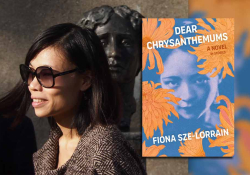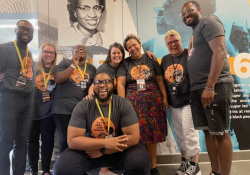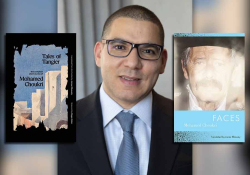“Poetry, like bread, is for everyone”: A Conversation with Seth Michelson
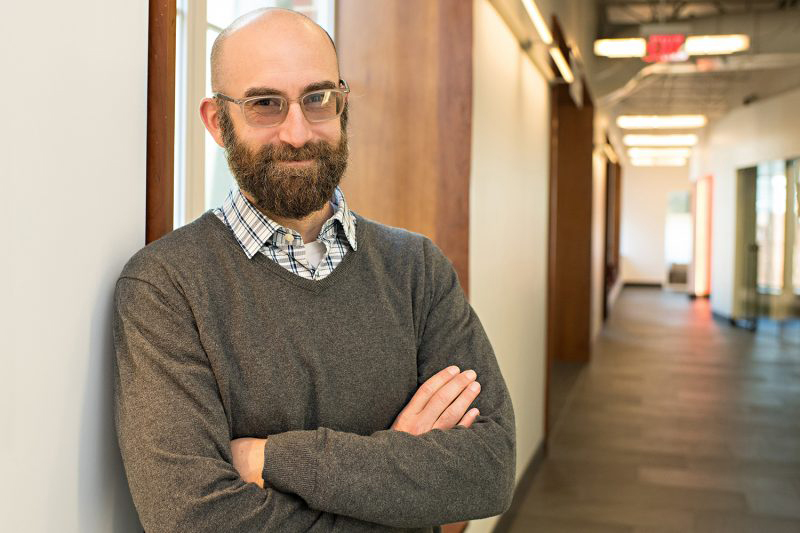
In October 2017 nonprofit press Settlement House released Dreaming America: Voices of Undocumented Youth in Maximum-Security Detention, a collection of forty-one poems by unaccompanied immigrant children held in maximum-security detention by the U.S. Office of Refugee Resettlement. These poems, originally written or narrated in Spanish, were translated into English by undergraduate students of Washington & Lee University and were edited and compiled by poet and professor Seth Michelson. Here, Michelson reflects on the challenges and inspirations of this project, and its mission to amplify voices that are systematically and persistently silenced.
Arthur Dixon: How did this project come about? What was the process of navigating the immigration and detention systems of the United States in order to meet and collaborate with the young people whose poems appear in the book?
Seth Michelson: This project emerged from my long-standing commitment to rethinking carcerality across the hemispheric Americas. Moreover, besides that research and writing, I’ve taught poetry workshops in English and Spanish in maximum-security prisons in a diversity of ways for almost twenty years now. More to the point here, I learned of the existence of this detention center not long after moving to Virginia, and soon thereafter I was working with its children. It did require some special permissions and agreements for access, as this detention center houses minors, and they are unaccompanied and undocumented in the U.S. On top of that, this is in fact the most restrictive maximum-security detention center in the U.S. for undocumented, unaccompanied youth, with the U.S. Department of Justice, U.S. Department of Homeland Security Immigration and Customs Enforcement, U.S. Customs and Border Protection, Office of Refugee Resettlement Division of Children’s Services, and the detention center’s internal administration all partaking in the orchestration of the children’s lives. So access is complicated, and it is carefully controlled. Yet somehow poetry found its way through all those overlapping systems into the children’s lives. And coming to workshop from lives in isolation cells, they loved it on many levels. Of note, the staff at the detention center was hugely supportive, too.
Somehow poetry found its way through all those overlapping systems into the children’s lives. And coming to workshop from lives in isolation cells, they loved it on many levels.
Dixon: What were the biggest challenges—be they linguistic, cultural, legal, etc.—in translating, editing, and publishing this collection of poems?
Michelson: As seemingly superficial and/or insignificant as it may initially sound, the biggest and most frustrating challenge was the failure to secure permission to publish each incarcerated poet’s name with his or her work. We tried repeatedly over many, many months to secure that permission, and the children had unanimously consented to it, wanting their names to appear on their poems. But we never received the necessary permission to include their names on their poems in the book. And however small a detail that may seem to readers, it felt to the children like yet another painful blow, another existential humiliation. That is, it felt—and feels—like another form of erasure of their presence, another way of silencing and hiding them from public discourse on immigration, which sorely needs a rich and eloquent diversity of voices on account of the complexity of the topic. And here these children were, courageously lifting their voices against all odds in poetry from isolation cells to join a crucial conversation, only to be rejected as individuals with noble, creative, and wise perspectives to share with the greater, translational community of nations debating this shared issue. More personally, and if you’ll forgive me for the melodramatic flair, I’d even suggest that the proscription of the children’s names comprises a form of ontological mutilation, and it certainly seems a coarse practice of sociopolitical censorship.
Dixon: What, if any, were the biggest surprises that you and your students encountered when meeting with undocumented youth and translating their poems?
Michelson: Great question! The experience has been filled with surprises good and bad.
Among the highlights are the surprise in realizing friendships form and deepen in new and profoundly sustaining ways among the incarcerated children through their shared poetry writing; the lightning strike to the heart of a gorgeous poem by a nearly aphasic, illiterate child leading to raucous applause by his podmates; and the joy of seeing a softening and warming of many a child after so much individual, prolonged suffering, so much violence, loss, and destitution for such young children to shoulder and surmount.
And that directly corresponds, too, to the dark surprise for the undergraduates, for example, in realizing just how deeply the sadness, injustice, and cruelty of these children’s lives have infiltrated each undergraduate’s psyche. Accordingly, I devoted much time, and continue to devote much time, to helping the undergraduates work through the so-called secondary trauma of opening themselves to the incarcerated children. There is a similar effect amongst support staff in the facility, who can burn out quickly due to the psychic rigors of working with these children in need.
Conversely, on the brighter side, the undergraduates were surprised by how easily they could connect with the incarcerated children, despite the radical differences in their lived experience and personal histories. That is, the undergraduates typically come from positions of relative comfort and ease compared to the incarcerated children, and yet they all made fast friends, in part due to the resilience of these remarkable, incarcerated children, and in part through the power of poetry to connect disparate lives, and in deep and meaningful ways. With a change of scenery and clothing, we could’ve been any workshop in the country pairing undergraduates with high-schoolers, whether in a community center, a high school gym, a university classroom, or otherwise!
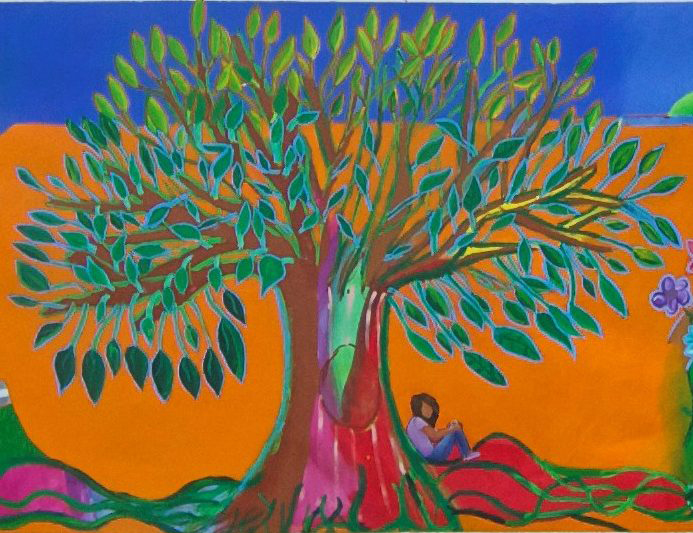
These children have poetry in their hearts, and the courage to share it.
I’ll add, too, that I remain stunned weekly by the power of the children’s poetry. They are among the finest young writers with whom I’ve ever had the pleasure and honor to work. Sure, they are very young teens, and they average a second-grade education. So the drafts might come out messy. But that truly is inconsequential. More importantly, they have poetry in their hearts, and the courage to share it. So it is relatively easy to organize it into written language, meaning that even our many illiterate poets—for whom we transcribe their narrated poetry, including their fastidious direction on lineation to create rhythm and meter—offer powerful, challenging work. After all, as I’ve mentioned, they are poets through and through. You can see this clearly in Dreaming America, and that might surprise some readers; it did the undergraduates.
Dixon: How did the young authors of Dreaming America react to the idea of writing poetry about their experiences? Had any of them written poetry before, and were any inspired to continue writing after?
Michelson: This is a great question requiring a multipronged response.
First and foremost, allow me to reiterate the generalized background of the children. Most were orphaned by age six or eight, grew up in some of the most violent and impoverished places in the hemispheric Americas, and abandoned schooling around second grade. In other words, literacy was not at the foreground of their lived experience, and none had studied poetry or poetry writing. But as the Mexican aphorism reminds us, “De poeta y loco, todos tenemos un poco” (we all have a bit of the poet and madman in us). So I encouraged them to try via similar logics, which their writing bore out as true.
Second, our process was complicated by the oppressive weight of the conditions of its enactment. In other words, we were and are trying to write openly, honestly, and vibrantly in a locale privileging the closed, laconic, and thanatic. This is even true at the legal level of the children’s captivity. Often narratives of their past—and not proven—criminal activity lie at the base of the justification for their detention, and none of us in the workshop wanted to imperil the children’s immigration cases by putting in writing potential (specious) evidence of supposed criminality. I therefore conversed with a diversity of highly respected immigration lawyers in multiple states prior to commencing the first workshop in order to ensure that their open discussion of their lives in writing could not be used in any deleterious way in the future as evidence in court cases pertaining to their immigration status. On a related note, our writing in workshops did, however, lead directly to our positive effort to bolster each child’s immigration case via handwritten letters by each undergraduate to the federal immigration judge reviewing the cases.
By summarizing in detail her experience with her incarcerated writing partner, the undergraduate hoped for the letter to add both a humanizing complexity to each child’s legal profile in court and a testament to the child’s potential to do great work in our communities if/once freed.
A third specific difficulty in bringing the children together for a workshop concerned my aim to create an atmosphere allowing each child to thrive as a writer, independently and in combination with others, with trust, respect, warmth, and curiosity, foreknowing that there would be marked differences in their various countries of origin, gang affiliation, sensibilities, and levels of literacy. Moreover, there is a large developmental schism between a thirteen-year-old and a seventeen-year-old, and as aforementioned, they have enjoyed minimal schooling, if any. So this was quite a heterogeneous group to cohere and focus. Thankfully, as Roque Dalton explains, “Poetry, like bread, is for everyone,” and the amazing young poets in Dreaming America came together, and continue to come together, proving Dalton’s claim.
A final interesting detail, too, is that few of the children had ever owned a book of his or her own, and now each child has a copy of a book in which he or she is a contributing author. It is hard to overstate their pride in holding and reading from that book.
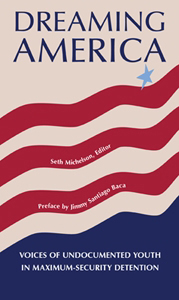 Dixon: As the editor of Dreaming America, what do you think are the most important themes or ideas that emerge in the book’s poems? Is there any particular element that unites all the poems, or do you prefer to think of them as diverse and distinct from one another?
Dixon: As the editor of Dreaming America, what do you think are the most important themes or ideas that emerge in the book’s poems? Is there any particular element that unites all the poems, or do you prefer to think of them as diverse and distinct from one another?
Michelson: Dealing with the second question first, I’d prefer to side with the latter perspective. The book reveals its authors to be as beautifully diverse as any group of teens. So perhaps I’m in fact endorsing the former independent clause of that second sentence: the poems are united in so far as they express the common theme of the struggle of an individual to endure the agonies of transitional moments in life, whether chronological, geographical, cultural, corporeal, linguistic, and/or legal. Another inescapable and constant commonality among the poems is the evidence of the oppressive psychic violence of isolation against the human spirit, which can be more or less explicit in each poem but nevertheless underpins it. Consequently, I think the major themes revolve around questions of un/freedom: un/freedom of minds, un/freedom of bodies, and un/freedom of people(s). Another way to think of the anthology is to consider it an exquisitely poetic and plurivocal interrogation of concepts of mobility, if that makes sense.
Dixon: Have you or your students been able to keep in touch with the young poets whose work appears in Dreaming America? If so, where are they now and how have their stories progressed?
Michelson: My undergraduate students, who spent the fall semester of 2016 in writing partnerships with the incarcerated children in the detention center for weekly poetry workshops, have not been able to stay in touch with the children for various legal and institutional reasons. Their relationships live on in Dreaming America, which extends their conversations outward to the public. Also, I hear of continued repercussions of their partnerships in the lives of both the undergraduates and the incarcerated children. For example, in the detention center, incarcerated poets often share with me new poems that have emerged from a previous writing experience with an undergraduate partner. Similarly, I’ve heard from more than one undergraduate sharing with me her decision to go into immigration law expressly because of her experience with her partners in the detention center. So the relationships live on, however much their form might shift.
Dixon: What is the goal of Dreaming America? Do you want readers to feel or behave differently after reading the book?
Michelson: The goal of Dreaming America is simply to connect these incarcerated children with the reading public. Through the book the children are reaching out to the country holding them captive and talking bravely and beautifully of shared futures. Consequently, I think that most readers will eventually recognize the children’s voices to be courageous, creative, resilient, forgiving, and hopeful, however dark and/or despairing any individual poem may be, and however brutally they’ve suffered.
I think that most readers will eventually recognize the children’s voices to be courageous, creative, resilient, forgiving, and hopeful, however dark and/or despairing any individual poem may be, and however brutally they’ve suffered.
I hope, too, that after reading the book, the reader cannot help but hear the children’s voices in her head whenever considering, discussing, or voting upon immigration policies. They complicate such considerations in important, honest ways. In this sense, I think the book is deeply humanizing to both the poets and the reader alike. It is a meditation on empathy through poetry, and it challenges us to rethink our national policies on hospitality and belonging.
November 2017
Editorial note: Arthur Dixon’s review of Dreaming America is forthcoming in the January 2018 issue of WLT, along with Seth Michelson’s translations of an essay and poetry by Liliana Ancalao, a Mapuche poet from Argentina.
